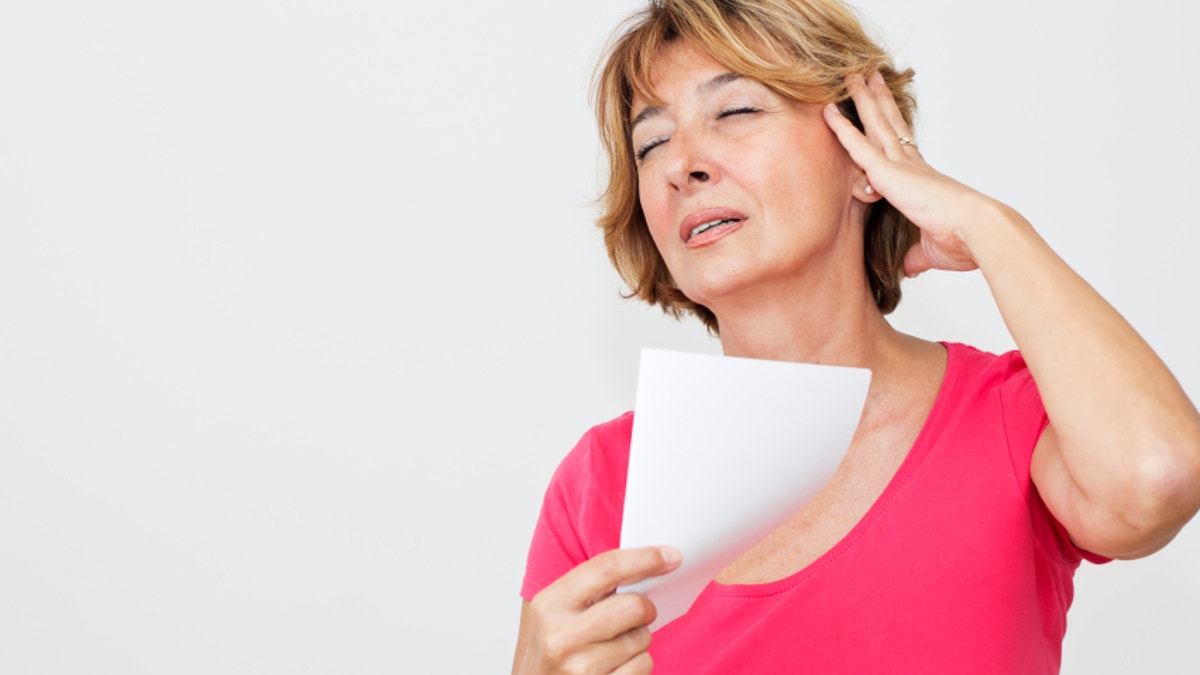
Woman cooling herself with a blank paper.
A significant proportion of women aged 60 to 65 were still having menopausal hot flashes and night sweats in a new Australian study, suggesting that bothersome symptoms last longer than is usually assumed and are mostly going untreated .
The use of hormone replacement therapy to relieve menopause symptoms has dropped dramatically in all age groups, the study authors note, but current guidelines advise against it for any women over 60, leaving this group with few options.
“Most of the recommendations regarding management of postmenopausal women apply to women less than 60 years old,” said Susan Davis, the study’s senior author. “So we specifically wanted to determine the prevalence of symptoms in women aged 60 to 65 years.”
Davis is a professor of women’s health and director of the Women's Health Research Program at Monash University in Melbourne.
Hot flashes and night sweats, also known as vasomotor symptoms, occur when the ovaries reduce their production of estrogen at menopause. While not all women experience these symptoms, for those who do, it can significantly affect quality of life.
“Some women simply cannot complete a day’s activities without considerable stress,” said Wulf Utian, an emeritus professor at Case Western Reserve University in Cleveland, Ohio, who was not involved in the study.
Although women typically go through menopause between the ages of 45 and 55, and vasomotor symptoms can start at any point during that transition, conventional wisdom holds that they only last a few years.
But one recent study found that for half of all women with bothersome hot flashes or night sweats, these symptoms typically last seven full years.
Davis and her colleagues analyzed data from a questionnaire-based study of women across Australia and focused on 2,020 participants between the ages of 40 and 65.
The researchers found that 42 percent of women 60 to 65 years old reported having hot flashes and night sweats, while 74 percent of women under 55 reported experiencing these symptoms.
For 6.5 percent of women between 60 and 65, the vasomotor symptoms were moderate to severe. The same was true for 28.5 percent of postmenopausal women under 55 and 15 percent of all women 55 to 60 years old.
Smoking and being overweight increased the likelihood of symptoms, while having an education beyond high school was linked to a lowered risk, Davis and her colleagues report in the journal Menopause.
Less than 12 percent of the postmenopausal women in any age group used hormonal therapy of any kind. Women aged 60 to 65 years were the greatest users of vaginal estrogen, a topical version of the treatment, with nearly 8 percent using this therapy.
Davis said in an email that hormone therapy is the most effective treatment for menopausal symptoms. She added that low dose antidepressant therapy can also give some relief.
Symptoms like hot flashes and night sweats may also be caused by other conditions, Utian noted. “Especially in older women other causes include hypertension (most frequent), diabetes, anxiety,” he told Reuters Health in an email.
The researchers write that current clinical guidelines recommend that hormone therapy should be limited to three to five years of use and should not be used by women over 60. They note that their results show there is some discrepancy between the recommendations and what doctors are prescribing. But they point out that overall hormone use was “strikingly low.”
Such low rates of medication may show that postmenopausal symptoms are not receiving sufficient attention, the study team writes. Utian agreed that the symptoms of this age group are undertreated.
Davis recommended that anyone who experiences severe symptoms “should seek out treatment from a reliable source.”
“This is a real symptom, not to be ignored, for which numerous options are available that will provide significant relief,” Utian said. “Don’t try and just live with it, see your health provider.”








































